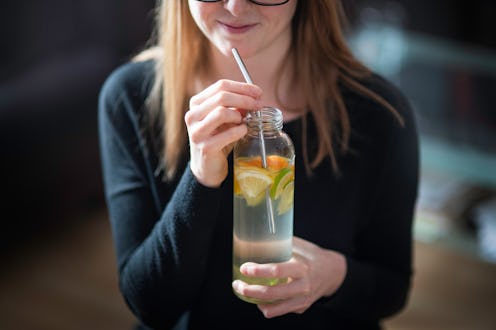Life
11 Little Diet Changes That Can Help With Anxiety

Anxiety is no fun, and if you're someone who suffers from it, you've likely tried to figure out some tweaks you can make in life to help you feel better. If you're hoping to avoid medication or want to supplement seeing a psychologist, you might consider some little diet changes that can help reduce your anxiety. Many people don't realize it, but what you eat can have a direct effect on how you feel, and your current diet could actually be causing your anxiety or making your anxiety worse.
We're so used to eating a certain way because of how we look and feel physically that we don't even think twice about what our eating habits can do to our brain. But there are many studies that show the link between diet and mental health, according to Harvard Health, and as crazy as it sounds, cleaning up your diet can end up improving your symptoms.
"Getting adequate nutrients is necessary for a healthy mind, body, and soul," says Jessica Swift, RD, also known as Chef Jess, over email. "Making sure you get in those 'feel good foods' is not only beneficial nutritionally but can help ward off anxiety."
Here are 11 little diet changes you can make that can help you reduce your anxiety.
1Eat More Protein
Eating a balance of food groups is essential to help combat anxiety, but protein is especially important. "Protein is responsible for helping stimulate the production of dopamine (the feel-good neurotransmitter) to help fight against anxiety," says Swift. "Try cheese, Greek yogurt and eggs."
2Eat More Omega-3 Fatty Acids
Multiple studies show a link between omega-3 fatty acid consumption and decreased anxiety, so eating foods rich in the nutrient can help with your mood, according to Psychology Today. "Try cold pressed flaxseed oil, chia seeds, and salmon for an omega-3 boost," says Swift.
3Try Mindful Eating
It's hard not to scarf your food down before heading out the door or eat your dinner while watching your favorite TV show, but these habits could actually be contributing to your anxiety. Instead, try to eat mindfully. Mindful eating includes taking your time to enjoy your food, paying attention to all your sense, taking bites and chewing slowly, etc. A study from the journal Healthcare Counseling & Psychotherapy Journal found that mindful eating can help reduce anxious thoughts, especially about food and your body.
4Cut Down On Caffeine
That morning cup of coffee can be so good, but it can also wreak havoc on your emotional state. "Caffeine is a stimulant, which means it causes an assortment of reactions in the body that mimic the symptoms of anxiety – think increased heart rate, increased blood pressure, and increased body temperature," says Dr. Candice Seti, Psy.D., CLC, CPT, CNC over email. "These are also symptoms that can trigger a panic attack. It is very common to see heightened anxiety responses after caffeine intake. It is advisable for anyone with anxiety to decrease or stop any caffeine intake."
5Drink More Water
Most people don't drink enough water, but even just mild dehydration can cause moodiness and fatigue, according to a study from the Journal of Nutrition. "Dehydration affects every system in your body, and without enough water, those systems start to malfunction," says Seti. "This includes things like hormone behavior, brain usage, and blood flow — all of which can trigger anxiety. Make sure you are getting ample amounts of water daily."
6Cut Down On Sugar
"Refine and processed sugar enters our blood stream very quickly, causing an impact on our blood sugar levels," says Seti. "This is usually a big spike, followed by a big drop — both of which can exacerbate anxiety symptoms. Stick to complex carbohydrates and unrefined sugar sources like fruit."
7Eat Throughout The Day
Going for long periods of time without eating can also cause your blood sugar to drop. The symptoms of low blood sugar (light-headedness, trembling, feelings of unsteadiness) overlap with the symptoms of panic, according to Psych Central, so it's best to keep yourself fed throughout the day to avoid any hunger-related anxiety.
8Stick To 1 Drink At Happy Hour
"Alcohol is a depressant, so it may provide individuals with anxiety some temporary relief," says Seti. "But the problem is that it is only temporary and then it can actually exacerbate symptoms of anxiety. Alcohol can cause dehydration and lower blood sugar levels, which can both cause an increase in anxiety."
9Eat More Vitamin C
"Vitamin C helps with anxiety by decreasing the amount of cortisol (the stress hormone) secreted by the adrenals," says Daphne Oliver, RD over email. "In addition a vitamin C deficiency is linked to decreased dopamine and serotonin in the brain, which is linked to anxiety."
10Eat More Vitamin B12
To help combat anxiety, you'll want to incorporate more foods that contain vitamin B12 such as oysters, sardines, egg yolks, salmon. "Vitamin B12 is beneficial because it helps with the methylation process (which is the individual cell’s process of detoxifying itself), eliminating some chemicals and hormones," says Oliver. "It also aids with building neurotransmitters dopamine and serotonin."
11Load Up On Tryptophan
"Most of us associate tryptophan with that sleepy feeling we get after filling up with turkey at Thanksgiving dinner, but tryptophan is actually a precursor to serotonin, a neurotransmitter that impact anxiety and depression," says Seti. "Good sources of tryptophan include pumpkin seeds, edamame, oats, and beans."
12Learn To Love Salad
There's a reason mom told you to eat those vegetables. "Green leafy vegetables because are high in magnesium, which is a calming mineral," says Oliver. Studies show that anxiety can be linked to magnesium deficiency, according to Psychology Today, so you'll want to load up on not only those greens, but other magnesium-rich foods such as nuts, seeds, beans, and whole grains.